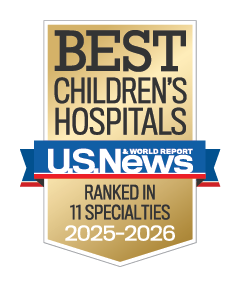

Beginning with prenatal diagnosis and proceeding with care throughout childhood, the UCSF Benioff Children’s Hospitals Neonatal Cardiovascular Center of Excellence provides comprehensive care for neonates with complex cardiovascular conditions. Beyond advanced surgical techniques offered by the center, the interdisciplinary team provides a holistic approach to care that optimizes critical neurologic and developmental patient outcomes.
Shabnam Peyvandi, MD, MAS, a pediatric cardiologist with the Neonatal Cardiovascular Center of Excellence, outlines the center’s goals for patient care, benefits the center provides patients, and translational research leading to advanced patient care.
What is the goal of the Neonatal Cardiovascular Center of Excellence?
The Neonatal Cardiovascular Center of Excellence offers multidisciplinary, comprehensive care for neonates and children with complex cardiovascular conditions. We care for patients beginning in fetal life upon diagnosis, through their first cardiac intervention, and throughout childhood with special attention to neurological and developmental outcomes.
What makes this center stand out among others?
There are three ways in which the center provides exceptional care for patients.
- Comprehensive, longitudinal care: From the Fetal Cardiovascular Program and Fetal Treatment Center to the Pediatric Heart Center and Pediatric Cardiac Intensive Care Unit, the center provides access to a range of programs and services for longitudinal care throughout every stage of a patient’s development.
I serve as the co-director of the Healthy Hearts and Minds Program, part of the center, providing care throughout patients’ childhood. The program identifies and addresses developmental and neurological issues in children born with complex heart defects, which is the most common complication among patients with congenital heart disease. - Specialized, innovative treatment: The center has specialized, proven workflows and protocols tailored to this unique patient population. The center’s advanced treatment options and technologies include:
- Catheter-based interventional palliation
- Surgical repair of heart defects in premature and low-birthweight infants
- Advanced imaging technologies, including fetal echocardiography, MRI and 3-D technologies for surgical planning
- The NEST (Nurturing Environment for Small HearTs), located in a dedicated wing of the Pediatric Cardiac Intensive Care Unit and designed to foster development in newborns, including cycled lighting, low noise levels and special support programs for families
- Holistic collaboration: The Neonatal Cardiovascular Center of Excellence is a multidisciplinary care team including pediatric heart surgeons, pediatric critical care specialists, neonatologists, respiratory therapists, dietitians, social workers and occupational therapists. The team fosters positive care environments and collaborates with parents and families to improve neurological and developmental outcomes. This holistic approach to care includes:
- The GRAND (Growth And NeuroDevelopment) Program: A specialized consulting team that coordinates interventions to promote healthy growth and brain development and incorporate family involvement in care
- Expert training and support for parents of infants with hypoplastic left heart syndrome so they can monitor their child's health at home in between critical surgeries
What research is the team conducting that affects this patient population?
The center’s team also includes several groups of investigators working on academic research addressing different aspects of neonatal cardiovascular conditions.
- The pulmonary hypertension program conducts basic science and translational and clinical research in this population.
- Focused on the epidemiology of this unique patient population, the program conducts population-based studies to understand clinical outcomes.
- The Pediatric Heart and Brain Research Program focuses on how the fetal and neonatal brain develops, risk factors for brain injury, and targets for intervention to optimize outcomes for children with congenital heart disease. Scientists in this program recently published a 20-year study in the Journal of the American College of Cardiology, confirming that modern advances in surgical and clinical care to maintain a higher postoperative blood pressure resulted in a 20% reduction in brain injuries for newborns with congenital heart disease.
With discoveries that lead to advanced treatment options, teams across the center conduct research on prenatal diagnosis, complex congenital heart disease, and the effect on patient outcomes.
To refer a patient to the Neonatal Cardiovascular Center of Excellence, visit our referral page or call (877) 822-4453.



